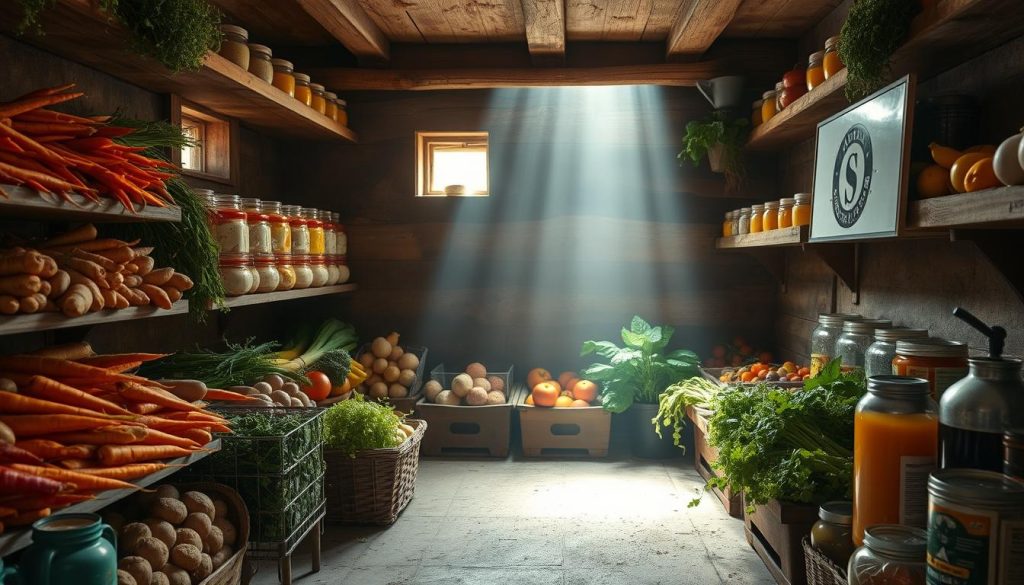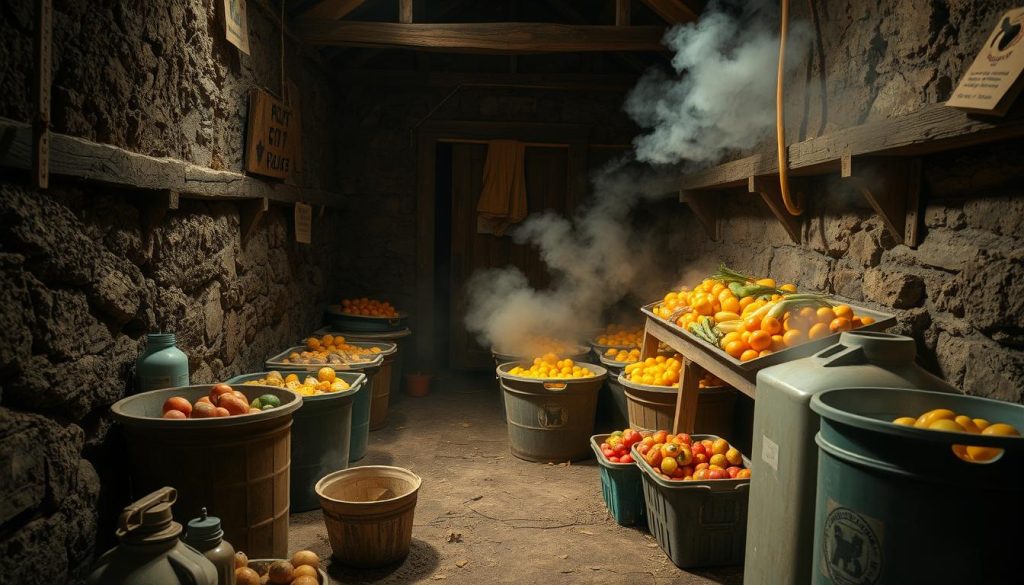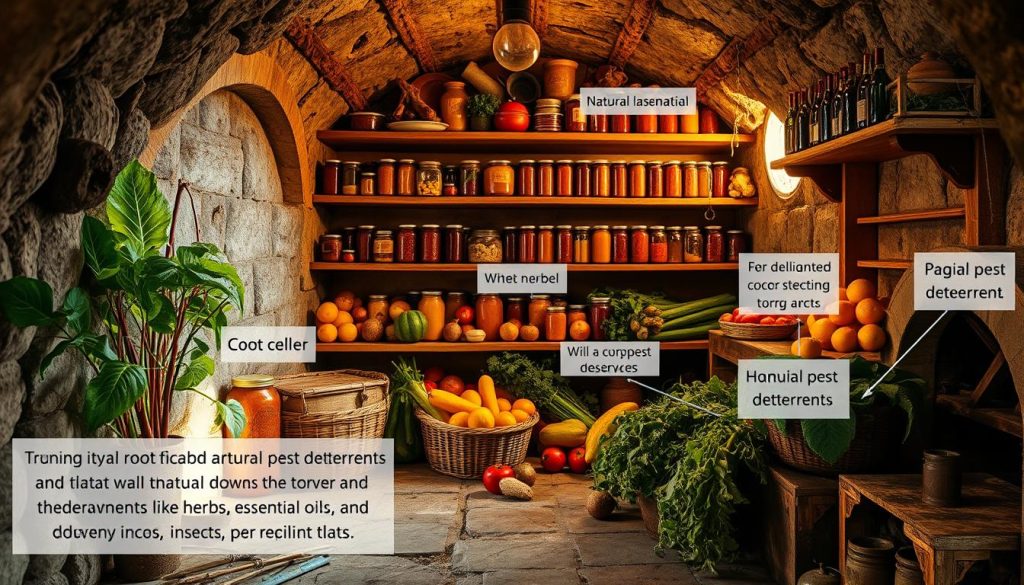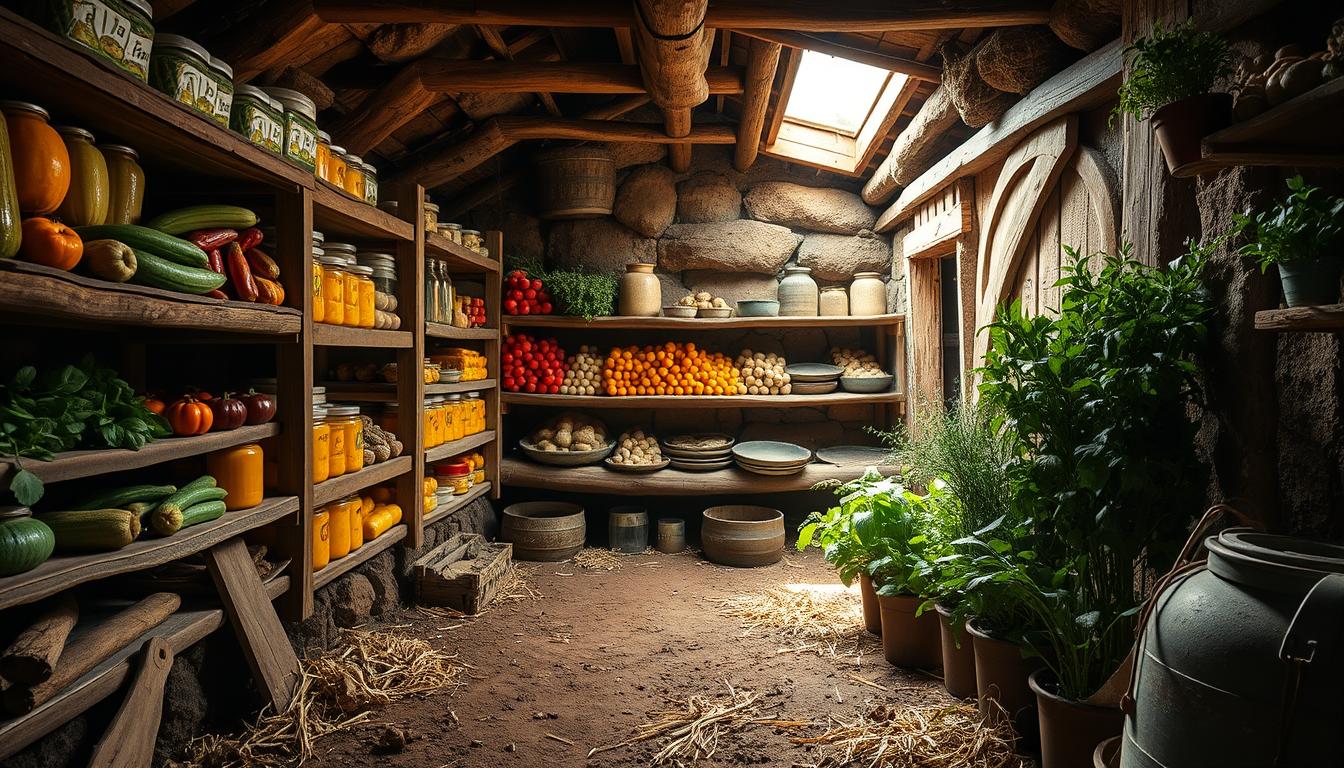Keeping your root cellar pest-free is key to storing your harvest safely. Root cellars can attract pests, risking your stored food. It’s important to use effective pest control to protect your crops.
Using both prevention and active control can keep your root cellar safe. You can choose from natural methods to stronger treatments. This way, your storage stays pest-free.
Discover how to keep your produce safe in your root cellar. We’ll look at pest-free storage solutions.
Understanding Root Cellar Pests
It’s key to know the pests that might harm our root cellar. We need to understand what pests hide in the dark and how they get in. This knowledge helps us keep our storage safe from these unwanted visitors.
Common Pests Found in Root Cellars
Root cellars can attract pests like rodents, insects, and molds. Common pests include mice, rats, beetles, and fungi. These pests can damage our stored food if we don’t manage them well.
Mice and rats can chew through almost anything. Beetles might infest grains and seeds. Fungi grow in damp places, spoiling our food. To fight these pests, we must know who they are and how they challenge us.
How Pests Enter Your Root Cellar
Pests sneak into root cellars through cracks, crevices, and other openings. They can also hide in the produce we store. Finding and sealing these entry points is vital to keep pests out.
To keep rodents out, we must inspect our root cellar carefully. We seal gaps, install door sweeps, and use tight lids on containers. This way, we prevent pests from making our storage their home.
Importance of Pest Control for Root Cellars

Keeping pests out of root cellars is key for food safety. Good management protects crops and veggies from damage and contamination. Let’s explore why this is important and how to do it.
Protecting Your Crops and Vegetables
Strong pest control keeps crops and veggies safe and fresh. Pests can ruin them, causing waste. Keeping the root cellar clean also stops harmful contaminants.
Without these steps, our food could be spoiled. This hurts both food safety and our harvest.
Preventing Damage and Contamination
Pests can damage stored goods, making them spoil fast. They can also bring harmful bacteria, risking food safety. Keeping the root cellar clean is crucial.
This way, we preserve our crops and keep them safe from health risks. A good pest control plan is essential. It ensures our crops stay fresh and healthy.
Signs of Pest Infestations
Spotting pest infestation signs in your root cellar early can save you a lot of trouble. Catching these signs early helps prevent severe damage. It also aids in keeping pests away.
Visual Indicators to Look For
There are several visual signs you should watch for:
- Droppings from rodents or insects.
- Nesting materials such as shredded paper or fabric.
- Damage to storage containers or produce.
- Bite marks or hollowed-out areas on fruits and vegetables.
Behavioral Signs of Pests
Behavioral signs can also show you have a pest problem:
- Unusual noises like scratching or gnawing, especially at night.
- Movements or sightings of pests in and around your root cellar.
Regular checks are key to keeping pests out. Knowing these signs helps keep your root cellar pest-free.
Effective Pest Control Methods

To keep your root cellar safe and pest-free, you need different strategies. Both natural and chemical methods work well, depending on your needs.
Natural Pest Control Techniques
Natural pest control uses organic pest solutions that are good for the environment. It includes:
- Plant-based repellents like essential oils and herbs keep pests away.
- Diatomaceous earth, a natural powder, dries out and kills small pests.
- Keeping your root cellar clean and dry helps prevent pests.
These methods follow Integrated Pest Management (IPM) rules. They mix prevention and action for a strong plan.
Chemical Treatments for Root Cellars
For serious pest issues, chemical treatments might be needed. You can use:
- Bait stations to attract and kill pests.
- Root cellar fumigation for big infestations.
Use these methods carefully to avoid health and environmental harm. Mixing them with organic pest solutions makes a safe and effective plan. It follows Integrated Pest Management (IPM) rules for long-term success.
Preventative Measures for Root Cellars

Keeping your root cellar pest-free is key to saving your food. To do this, clean often, organize well, and check for pests regularly. Here are some tips to keep your root cellar pest-free.
Best Practices for Maintaining a Pest-Free Environment
Start by keeping your root cellar clean. Remove bad food, sweep the floor, and clean surfaces with a safe cleaner. Catching pests early can prevent big problems.
- Regular Cleaning: Clean all surfaces and storage containers regularly to deter pests.
- Organization: Keep items off the ground to allow proper air circulation and make it harder for pests to hide.
- Inspection: Conduct periodic checks for any possible sign of infestation, such as droppings or gnaw marks.
Choosing the Right Materials for Storage
Choosing the right storage materials is also key for keeping pests out. Use strong containers with tight lids to keep pests away. Also, pick breathable fabrics to control humidity, which pests love.
- Sturdy Containers: Use heavy-duty plastic or metal containers with sealing lids.
- Breathable Fabrics: Incorporate materials like burlap that allow for air circulation while protecting the items inside.
- Proper Ventilation: Ensure your cellar is well-ventilated to avoid excess moisture build-up.
Seasonal Considerations for Pest Control
Changing pest control strategies with the seasons is key to keeping your root cellar pest-free. Each season brings its own challenges. Being ready can greatly help in keeping pests out.
Preparing Your Root Cellar for Seasonal Changes
When it gets colder, insulating your root cellar is crucial. It keeps the temperature right and keeps rodents out. Also, controlling moisture is important to stop mold and mildew, which pests like.
In summer, watch out for humidity and bugs. Use dehumidifiers and seal any gaps to keep it dry and pest-free. Adjusting how you store food for each season is vital for keeping pests away.
Timing Your Pest Control Efforts
Timing your pest control right can make it more effective. Do pre-harvest treatments to keep pests away from your crops. Also, check for pests after harvest to catch any early.
By doing these steps with the seasons in mind, you can keep your root cellar safe all year. Staying proactive with pest control is essential for managing pests well.
Monitoring and Maintenance Strategies
Keeping a root cellar in good shape is key to protecting your food from pests. Regular checks and advanced systems help keep your food safe and fresh. This way, you can enjoy your stored produce for a long time.
Regular Inspections and Checks
Setting up a maintenance schedule is vital. Regular checks can spot problems early. I look for pests, damage, and moisture during these inspections.
Root cellar audits help find areas that need quick attention. They keep your storage space healthy and safe.
Building a Pest Monitoring System
Every root cellar owner should think about a pest monitoring system. Tools like traps and electronic systems are great for catching pests early. Keeping records of pest activity and food condition is also important.
Updating these records regularly helps in keeping your food fresh for a long time. It’s all about maintaining your root cellar well.
Professional Pest Control Services
Dealing with pests in your root cellar can be tough. That’s why calling root cellar pest experts is a smart move. They don’t just treat the symptoms. They get to the root of the problem.
When to Call in the Experts
If DIY methods don’t work, it’s time to get help. Root cellar pest experts can find and fix the real cause of the problem. They offer lasting solutions.
- When home remedies fail
- In case of large infestations
- If you notice recurring pest problems
What to Expect from Pest Control Professionals
Exterminator services do more than just get rid of pests. Here’s what you can expect:
- A detailed inspection to find problem spots
- Treatment plans made just for you
- Advanced techniques and products not available to everyone
- Follow-up visits to make sure pests are gone for good
Choosing professional exterminator services means your root cellar is in good hands. You can relax, knowing it’s protected.
Eco-Friendly Pest Control Solutions
Using sustainable pest control methods protects your root cellar and helps the environment. These green solutions manage pests without harming our surroundings with chemicals.
Sustainable Practices for Root Cellar Management
Creating a balanced ecosystem in your root cellar is key. This means using biological controls like predators or parasites of pests. It makes your root cellar a healthy place where pests are naturally controlled.
Using organic repellents and keeping things clean is also important. These steps help keep pests away without chemicals.
Benefits of Choosing Eco-Friendly Approaches
Choosing eco-friendly pest control has many advantages. It cuts down on chemical use and supports biodiversity, like organic farming. Plus, it keeps your crops and veggies safe from harmful residues.
In the end, these green practices help create a better, more lasting environment for all of us.

